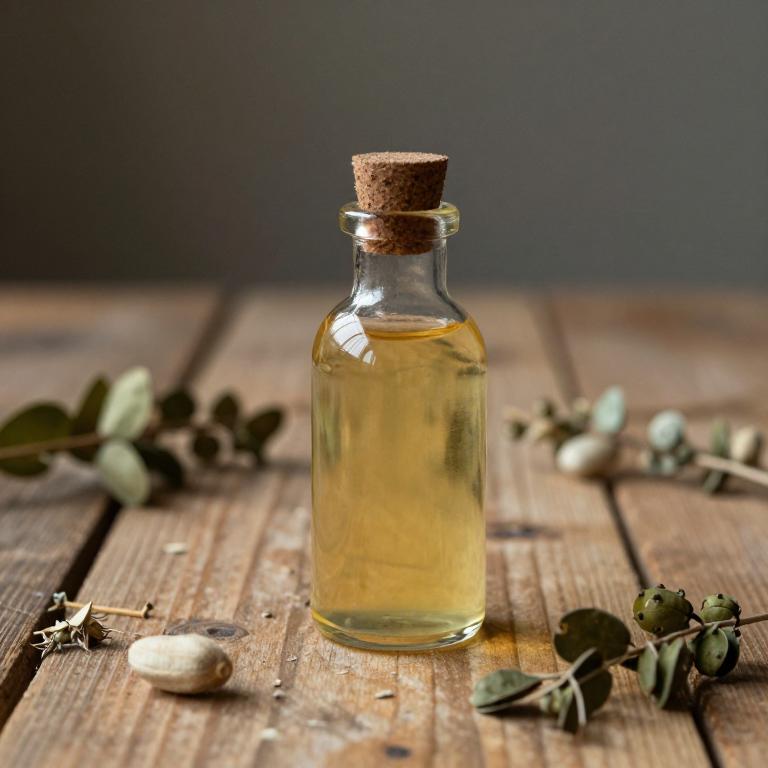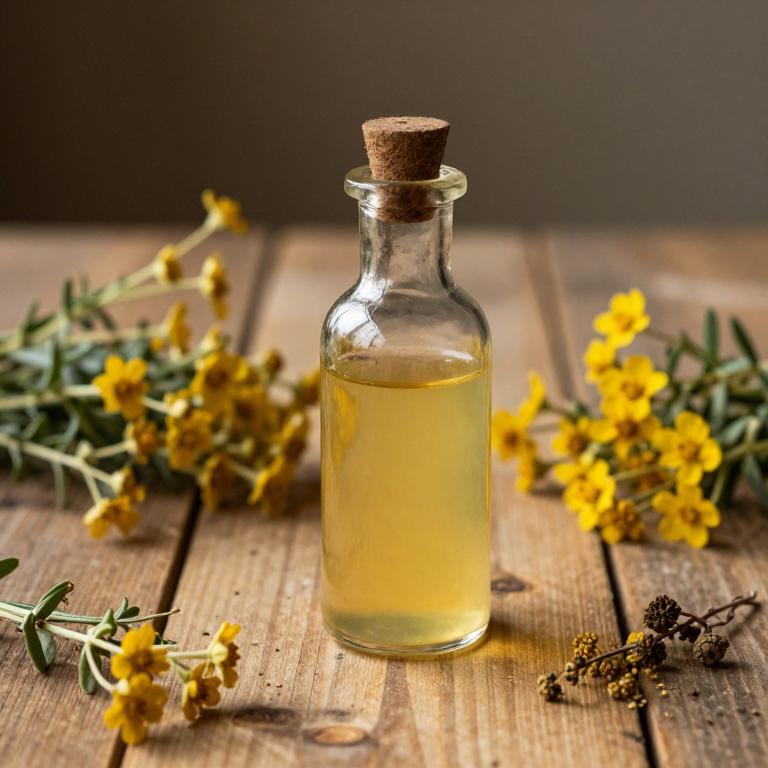10 Best Herbal Juices For Fever

Herbal juices have been traditionally used to help alleviate symptoms of fever by supporting the body's natural healing processes.
Common herbs like ginger, turmeric, and mint are often included in these juices due to their anti-inflammatory and cooling properties. Ginger juice, for instance, can help reduce body temperature and ease nausea associated with high fevers. Turmeric, rich in curcumin, may support immune function and reduce inflammation, while mint can provide a refreshing effect and help with respiratory discomfort.
Although herbal juices can be a natural complement to fever management, they should not replace professional medical advice, especially for persistent or high-grade fevers.
Table of Contents
- 1. Echinacea (Echinacea purpurea)
- 2. Ginger (Zingiber officinale)
- 3. Peppermint (Mentha piperita)
- 4. Ceylon cinnamon (Cinnamomum verum)
- 5. Stinging nettle (Urtica dioica)
- 6. Rosemary (Rosmarinus officinalis)
- 7. Licorice (Glycyrrhiza glabra)
- 8. Yarrow (Achillea millefolium)
- 9. Black pepper (Piper nigrum)
- 10. Thyme (Thymus vulgaris)
1. Echinacea (Echinacea purpurea)

Echinacea purpurea, commonly known as purple coneflower, is a popular herbal remedy often used to support the immune system.
While it is traditionally used for colds and flu, some studies suggest it may help reduce the duration and severity of fever when taken as a herbal juice. The active compounds in echinacea, such as alkamides and flavonoids, are believed to have anti-inflammatory and antiviral properties that may aid in fever reduction. However, it is important to note that echinacea is not a substitute for medical treatment, and individuals with certain health conditions should consult a healthcare provider before use.
When prepared as a juice, echinacea can be consumed fresh or in supplement form, though its effectiveness for fever specifically requires further scientific validation.
2. Ginger (Zingiber officinale)

Zingiber officinale, commonly known as ginger, has been traditionally used for its medicinal properties, including its potential to alleviate fever.
Ginger contains bioactive compounds such as gingerol and shogaol, which possess anti-inflammatory and antipyretic effects that may help reduce body temperature. Herbal juices made from fresh ginger can be consumed as a natural remedy to support the body's recovery from fever by promoting sweating and enhancing metabolic processes. To prepare ginger juice for fever, fresh ginger root is typically sliced, juiced, and mixed with water or honey for better palatability.
While ginger juice can complement conventional treatments, it is advisable to consult a healthcare professional before using it as a primary remedy for fever, especially in severe or persistent cases.
3. Peppermint (Mentha piperita)

Mentha piperita, commonly known as peppermint, has been traditionally used in herbal medicine for its cooling and soothing properties.
Peppermint herbal juices are often recommended to help alleviate symptoms of fever by promoting perspiration and reducing body temperature. The essential oils in peppermint, such as menthol, have a mild antiseptic effect that may support the body's natural healing processes. However, it is important to consult a healthcare professional before using peppermint juice, especially for children or individuals with certain health conditions.
While peppermint can be a helpful complementary remedy, it should not replace conventional medical treatments for fever.
4. Ceylon cinnamon (Cinnamomum verum)

Cinnamomum verum, commonly known as true cinnamon, has been traditionally used in herbal medicine for its potential therapeutic properties.
When prepared as a herbal juice, it is believed to help alleviate symptoms of fever by promoting sweating and reducing body heat. The essential oils in cinnamon, such as cinnamaldehyde, possess antimicrobial and anti-inflammatory effects that may support the body's immune response. To prepare the juice, fresh or dried cinnamon bark is typically blended with water or a mild citrus juice for better absorption.
However, it is important to consult a healthcare professional before using cinnamon juice, especially for prolonged periods or in high doses, to avoid potential side effects.
5. Stinging nettle (Urtica dioica)

Urtica dioica, commonly known as stinging nettle, has been traditionally used in herbal medicine for its various health benefits, including its potential role in managing fever.
The leaves and stems of this plant contain bioactive compounds such as flavonoids, vitamins, and minerals that may help reduce inflammation and support the immune system. Herbal juices made from fresh or dried Urtica dioica can be consumed internally to help lower body temperature and alleviate symptoms associated with fever. However, it is important to consult a healthcare professional before using nettle juice, especially for prolonged periods or in combination with other medications.
While some studies suggest its efficacy, more research is needed to fully understand its therapeutic potential for fever management.
6. Rosemary (Rosmarinus officinalis)

Rosmarinus officinalis, commonly known as rosemary, has been traditionally used in herbal medicine for its potential health benefits, including its role in managing fever.
The essential oils and compounds found in rosemary, such as rosmarinic acid and cineole, are believed to have antipyretic properties that may help reduce body temperature. Herbal juices made from fresh rosemary leaves can be consumed internally to support the body's natural cooling processes during a fever. These juices are often combined with other cooling herbs like mint or ginger to enhance their effectiveness.
However, it is important to consult with a healthcare professional before using rosemary juices, especially for prolonged or high fevers, to ensure safety and proper treatment.
7. Licorice (Glycyrrhiza glabra)

Glycyrrhiza glabra, commonly known as licorice, has been traditionally used in herbal medicine for its potential therapeutic properties, including its ability to alleviate fever.
The root of the plant contains glycyrrhizin, a compound that exhibits anti-inflammatory and antiviral effects, which may help reduce fever symptoms. Herbal juices made from licorice root are often prepared by extracting the active compounds through water or alcohol, making them easily consumable. These juices are believed to support the body's immune response and may help lower body temperature in cases of mild fever.
However, it is important to consult a healthcare professional before using licorice-based remedies, especially for prolonged periods, due to potential side effects and interactions with other medications.
8. Yarrow (Achillea millefolium)

Achillea millefolium, commonly known as yarrow, has been traditionally used in herbal medicine for its potential health benefits, including its use in managing fever.
The plant contains various bioactive compounds such as flavonoids, essential oils, and alkaloids, which may contribute to its therapeutic properties. Herbal juices made from fresh or dried yarrow leaves can be prepared to support the body's natural cooling mechanisms during fever. However, it is important to consult with a healthcare professional before using yarrow juice, as it may interact with certain medications or have contraindications for specific health conditions.
While some traditional practices suggest yarrow may help reduce fever symptoms, more scientific research is needed to fully confirm its efficacy and safety in modern herbal medicine.
9. Black pepper (Piper nigrum)

Piper nigrum, commonly known as black pepper, is often used in herbal remedies for its warming properties and potential therapeutic benefits.
While it is not typically consumed as a standalone juice for fever, it can be incorporated into herbal blends to support the body’s natural healing processes. Some traditional practices suggest that black pepper may help improve circulation and stimulate the immune system, which could aid in managing fever symptoms. When combined with other herbs like ginger or turmeric, piper nigrum may enhance the effectiveness of herbal juices for fever relief.
However, it is important to consult a healthcare professional before using any herbal remedies, especially for persistent or high fever.
10. Thyme (Thymus vulgaris)

Thymus vulgaris, commonly known as thyme, has been traditionally used in herbal medicine for its potential benefits in reducing fever.
The essential oils and compounds found in thyme, such as thymol and carvacrol, possess antimicrobial and anti-inflammatory properties that may help in alleviating symptoms associated with fever. Thyme herbal juices are often prepared by infusing fresh or dried thyme leaves in water or a mild vinegar solution, making them easy to consume. These juices are believed to support the body's immune response and promote a natural cooling effect during feverish conditions.
However, it is important to consult a healthcare professional before using thyme-based remedies, especially for children or individuals with underlying health conditions.